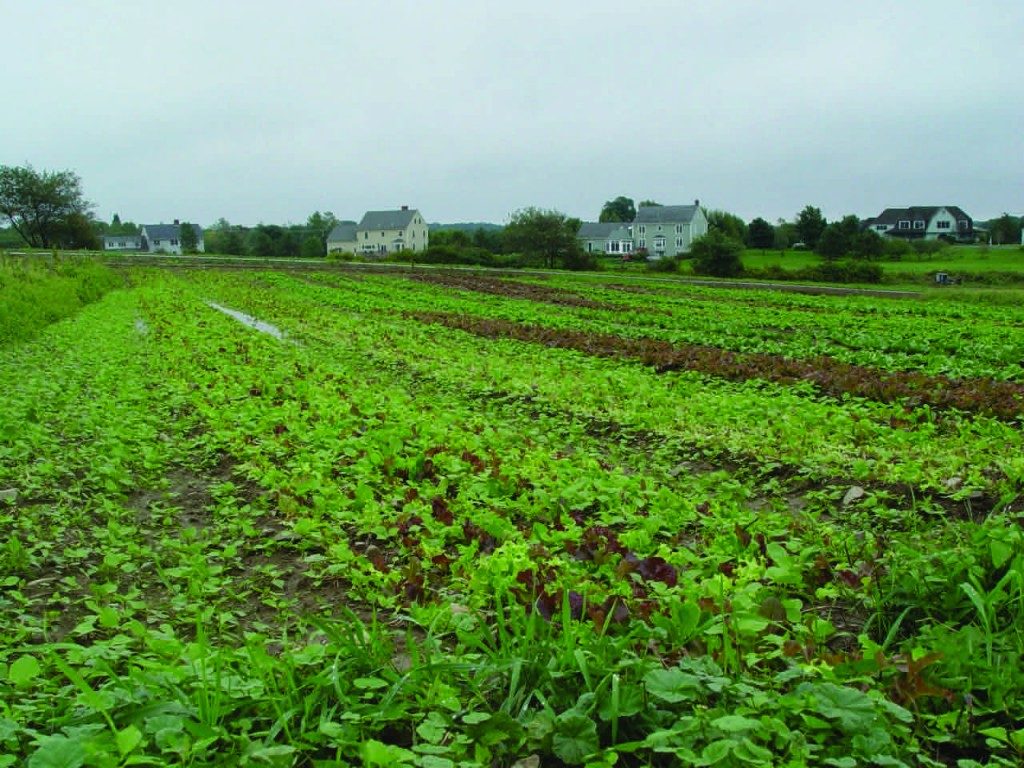Piper Shores and the Cape Elizabeth Land Trust share a common passion for local farms, and the two nonprofit organizations are collaborating in a creative initiative designed to bring greater awareness – and more visitors – to local farm stands. The idea for the farm-stand collaboration was born last winter at a screening of Growing Local, an award-winning documentary film that explores the growing pains of the local food movement in Maine and the uncertain fate of farmers and farmland.

The film screening was organized by Maine Farmland Trust and Cape Farm Alliance, in cooperation with the Cape Elizabeth Land Trust. Like so many events, it spawned a vibrant and vital conversation about the importance of farms, not only as open spaces, but also as sources of healthy local food and community culture. Despite a dynamic local food, farm-to-table, and farmer’s market movement in Maine, the threat of development is real and growing, especially in southern Maine.
A sense of urgency
“Here at the Cape Elizabeth Land Trust, we are feeling a sense of urgency about ensuring our local farms will continue to have a direct and measurable public benefit to our community,” said Christopher Franklin, Executive Director of the Cape Elizabeth Land Trust, a community-based organization established in 1985, which has permanently protected over 650 acres of land. “We feel that some windows are starting to close, and we want to be able to do as much of this work as we can now.”
Motivated by this sense of urgency, Franklin notes that the Cape Elizabeth Land Trust, Piper Shores, and other key supporters developed and unveiled a creative plan to increase awareness and visits to local farm stands. The idea is that between May 1st and August 31, every new or renewing Land Trust member will not only have their donation matched, but they will also receive a $10 gift certificate redeemable at any of the five participating Cape Farm Stands (Fox Run Farm, William H. Jordan Farm, Alewive’s Brook Farm, Green Spark Farm, and Maxwell’s Farm).
To date over 100 donations have been received, and the Land Trust is one-third of its way toward a 300-member donation goal. Piper Shores was generous enough to donate funds to offset the cost of the coupons, noted Franklin. “CELT very much appreciates the support, and we hope to repay it with good deeds,” he said.
Driving dollars into the hands of farmers
As a land trust, Franklin notes that his team is often focused on land acquisition, yet the farm stand collaboration is a creative and strategic way to drive dollars into the hands of farmers. “This idea seemed like a great way to demonstrate our support for the business of farming and the families they support,” said Franklin. “By getting our own community members through farm stand doors, we are actually working to improve their bottom line and to cultivate a greater appreciation for how much these family farms benefit our community.”
For many farmers, increasing business at the local farm stand is preferable even to farmers markets, he explained. “Farmers markets are great for our local farms, but when you add in time, travel, and the packing and unpacking of produce, the farm stands are more beneficial because they allow farmers to stay out in their fields.”
A collective impact
For a long time, land conservation was focused on habitat protection and the development of recreational trails designed to satisfy the need of the community to get outside, exercise, and observe nature. “But farmland has always been one of those cultural centers of our community,” noted Franklin. “Not only are we seeing increased interest in farms, and increased enjoyment of local food, but these farms are often generations old and have added a cultural value to Cape Elizabeth for the entirety of the town’s 250 year history.”
In fact, Franklin explains that while the work of local land trusts started as a “think globally / act locally” venture, today there are 89 active lands trusts in Maine and, in fact, it’s the local acts of land trusts that will strengthen our state’s resilience as we confront global environmental issues.
“It is quite extraordinary to see how – collectively – we have impacted the state,” said Franklin. For many land trust supporters, the dividing lines between towns is of less importance, he explained. Piper Shores may be located in Scarborough, for example, but the lands of Scarborough and Cape Elizabeth are connected. Seen holistically, the land trust connections create a powerful patchwork of open space, open farmland, and wildlife habitat across Maine.
“We are delighted to be able to support the important work of our local land trusts,” said Piper Shores CEO Jim Adamowicz. “Our community of residents and staff are direct beneficiaries of the open space and farmland preservation initiatives provided by the land trusts in Scarborough, Cape Elizabeth and our surrounding towns.”
The Cape Elizabeth Land Trust is excited to work with Piper Shores on any number of collaborations that support the local community, and they will continue to look for opportunities to promote local farms. “We may consider featuring local farms in our monthly newsletter and we are looking to hold an event at the end of August that will feature local foods,” said Franklin.
For now, the Cape Elizabeth community is doing what it can to ensure their farms will be as important to the town’s future as they have been to its past, he said.
Cape Elizabeth Fun Facts
- Cape Elizabeth has the longest growing season in the state of Maine.
- Today there are well over 20 commercial farms
- In the 1950s there were more than 50 family farms
- One-third of Cape Elizabeth is comprised of wetlands
- Cape Elizabeth has 3,000 households
- The Cape Elizabeth Land Trust has 600 members